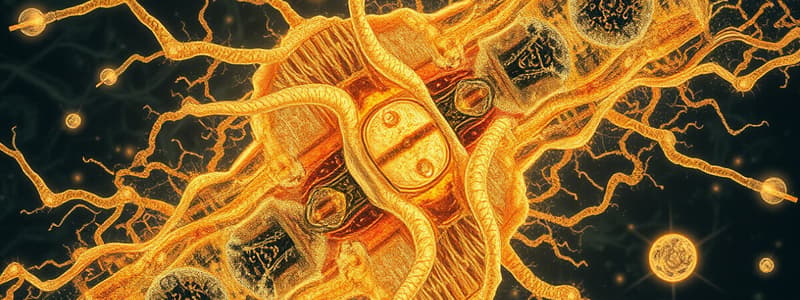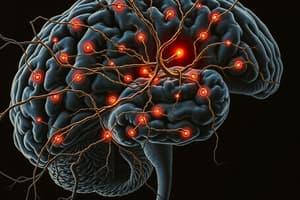Podcast
Questions and Answers
Which part of the nervous system is responsible for carrying outgoing information to muscles and glands?
Which part of the nervous system is responsible for carrying outgoing information to muscles and glands?
- Motor (efferent) neurons (correct)
- Autonomic nervous system
- Sensory (afferent) neurons
- Interneurons
The sympathetic nervous system is responsible for calming the body and promoting rest and digestion.
The sympathetic nervous system is responsible for calming the body and promoting rest and digestion.
False (B)
What are the two major divisions of the nervous system?
What are the two major divisions of the nervous system?
Central Nervous System and Peripheral Nervous System
The sensory neurons are also known as _____ neurons.
The sensory neurons are also known as _____ neurons.
Match the following subdivisions of the peripheral nervous system with their functions:
Match the following subdivisions of the peripheral nervous system with their functions:
Flashcards are hidden until you start studying
Study Notes
Overview of the Nervous System
- Comprised of approximately 86 billion neurons in the brain.
- Neurons are the fundamental building blocks of the nervous system.
Major Divisions
- The nervous system is divided into two main parts:
- Central Nervous System (CNS): Includes the brain and spinal cord.
- Peripheral Nervous System (PNS): Connects the CNS to the rest of the body.
Neuron Types
- Afferent Neurons (Sensory Neurons):
- Transport sensory information from receptors to the brain and spinal cord.
- Interneurons:
- Found within the brain and spinal cord.
- Serve as connectors between sensory inputs and motor outputs.
- Efferent Neurons (Motor Neurons):
- Convey outgoing information from the brain and spinal cord to muscles and glands.
Reflex Action
- A reflex illustrates the simplicity of nervous system responses, involving quick, involuntary actions in response to stimuli.
Subdivisions of the Peripheral Nervous System
- Autonomic Nervous System (ANS):
- Regulates involuntary bodily functions.
- Has two main components:
- Sympathetic Nervous System: Prepares the body for “fight-or-flight” response, increasing alertness and energy expenditure.
- Parasympathetic Nervous System: Promotes “rest and digest” functions, calming the body and conserving energy.
Studying That Suits You
Use AI to generate personalized quizzes and flashcards to suit your learning preferences.




